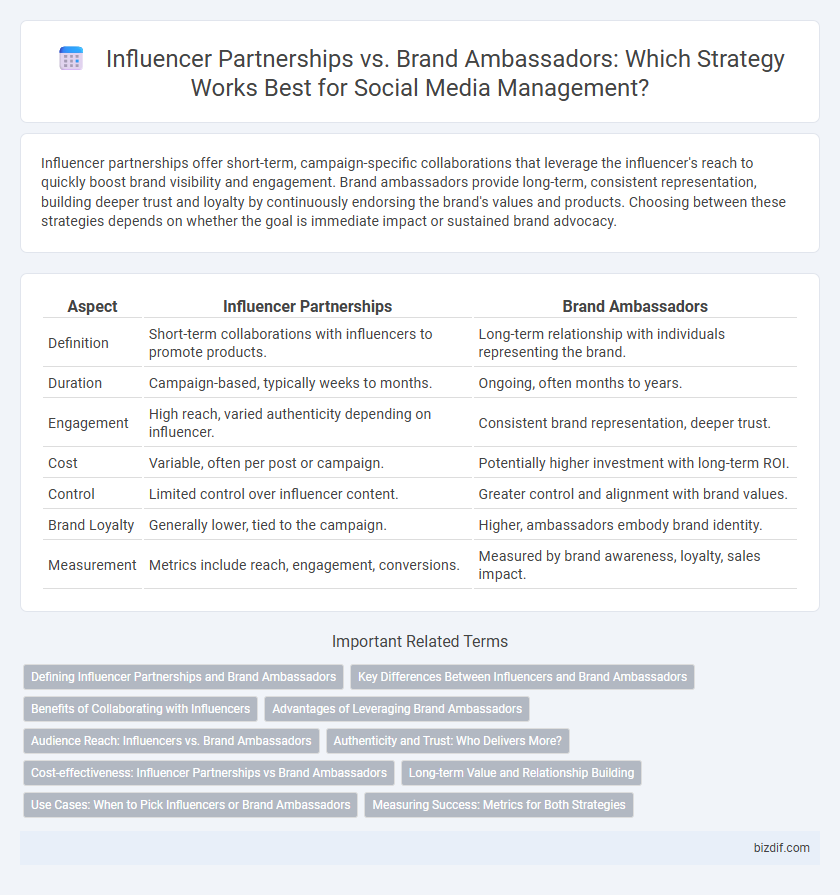Influencer partnerships offer short-term, campaign-specific collaborations that leverage the influencer's reach to quickly boost brand visibility and engagement. Brand ambassadors provide long-term, consistent representation, building deeper trust and loyalty by continuously endorsing the brand's values and products. Choosing between these strategies depends on whether the goal is immediate impact or sustained brand advocacy.
Table of Comparison
| Aspect | Influencer Partnerships | Brand Ambassadors |
|---|---|---|
| Definition | Short-term collaborations with influencers to promote products. | Long-term relationship with individuals representing the brand. |
| Duration | Campaign-based, typically weeks to months. | Ongoing, often months to years. |
| Engagement | High reach, varied authenticity depending on influencer. | Consistent brand representation, deeper trust. |
| Cost | Variable, often per post or campaign. | Potentially higher investment with long-term ROI. |
| Control | Limited control over influencer content. | Greater control and alignment with brand values. |
| Brand Loyalty | Generally lower, tied to the campaign. | Higher, ambassadors embody brand identity. |
| Measurement | Metrics include reach, engagement, conversions. | Measured by brand awareness, loyalty, sales impact. |
Defining Influencer Partnerships and Brand Ambassadors
Influencer partnerships involve collaborations with individuals who have a significant social media following and engage their audience through sponsored content, product placements, or endorsements, typically on a short-term or campaign basis. Brand ambassadors represent a long-term relationship where individuals consistently promote a brand's values, products, or services, acting as official representatives and fostering deeper brand loyalty over time. Both strategies aim to increase brand visibility and trust but differ in commitment duration and engagement style.
Key Differences Between Influencers and Brand Ambassadors
Influencers typically engage with audiences through short-term, campaign-based content, leveraging their online reach to boost brand visibility quickly, while brand ambassadors develop long-term relationships that foster deeper trust and consistent brand messaging. Influencers often prioritize creativity and trend-driven promotion across multiple platforms, whereas brand ambassadors embody the brand's values and advocate authentically over time. The key difference lies in the nature of collaboration: influencers offer breadth and immediacy, whereas brand ambassadors provide sustained loyalty and brand alignment.
Benefits of Collaborating with Influencers
Collaborating with influencers amplifies brand reach by tapping into their established, loyal audiences, resulting in higher engagement and authentic promotion. Influencers often create dynamic, organic content that resonates well with target demographics, increasing trust and brand visibility. This partnership fosters flexible marketing strategies with measurable ROI through social metrics, boosting long-term customer acquisition and retention.
Advantages of Leveraging Brand Ambassadors
Brand ambassadors offer authentic, long-term engagement by consistently promoting a brand's values and products over time, fostering trust among their audience. Their deep connection with the brand leads to higher conversion rates and enhanced brand loyalty compared to one-off influencer campaigns. Leveraging brand ambassadors also provides continuous content creation and organic word-of-mouth marketing, amplifying brand reach sustainably.
Audience Reach: Influencers vs. Brand Ambassadors
Influencers typically offer broader audience reach due to their large follower base across multiple platforms, making them ideal for short-term campaigns targeting mass engagement. Brand ambassadors maintain a smaller, more dedicated audience, fostering deeper trust and long-term loyalty through consistent brand representation. Choosing between influencers and brand ambassadors depends on whether the goal is wide exposure or sustained consumer connection.
Authenticity and Trust: Who Delivers More?
Influencer partnerships often provide short-term reach with diverse audiences but can lack the deep trust found in long-term brand ambassadors, who embody consistent authenticity and foster genuine connections. Brand ambassadors create sustained credibility by aligning closely with brand values, enhancing trust through ongoing engagement. Data shows consumers are 71% more likely to trust recommendations from brand ambassadors than from one-off influencer endorsements.
Cost-effectiveness: Influencer Partnerships vs Brand Ambassadors
Influencer partnerships often provide greater cost-effectiveness by enabling brands to reach targeted audiences quickly through short-term, campaign-based collaborations that can be tailored to specific budgets. Brand ambassadors typically require longer-term commitments and higher upfront costs but offer sustained engagement and authentic representation that can enhance brand loyalty over time. Evaluating the cost-per-engagement and return on investment is essential when deciding between the scalable flexibility of influencer partnerships and the deep-rooted trust cultivated by brand ambassadors.
Long-term Value and Relationship Building
Influencer partnerships typically offer short-term campaigns with high reach, while brand ambassadors provide sustained long-term value through ongoing promotion and authentic relationship building. Brand ambassadors deepen trust and loyalty by consistently representing the brand's core values over extended periods, fostering stronger consumer connections. Long-term relationships with brand ambassadors result in higher customer retention and enhanced brand equity compared to one-off influencer collaborations.
Use Cases: When to Pick Influencers or Brand Ambassadors
Influencer partnerships are ideal for short-term campaigns focused on rapid product launches, trend engagement, or reaching a broad audience quickly through authentic, high-impact content. Brand ambassadors excel in long-term collaborations that build trust, foster loyalty, and create consistent brand messaging across multiple touchpoints. Choosing influencers suits objectives like viral marketing and event promotions, while brand ambassadors are better for sustained brand advocacy and community building.
Measuring Success: Metrics for Both Strategies
Measuring success in influencer partnerships relies on metrics such as engagement rates, reach, and conversion tracking through affiliate links or promo codes, providing immediate insights into campaign impact. Brand ambassador programs focus on long-term metrics like customer loyalty, repeat purchase rates, and brand sentiment to assess sustained brand affinity. Both strategies benefit from sentiment analysis, social listening, and ROI calculations to evaluate overall effectiveness and optimize future campaigns.
Influencer partnerships vs brand ambassadors Infographic

 bizdif.com
bizdif.com